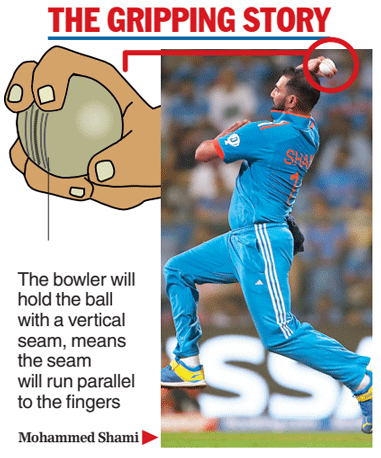Wasim Akram has been called the Sultan of Swing. Mohammed Shami can stake claim to the sobriquet Sultan of Seam.
Shami is already the highest wicket-taker in this edition of the World Cup, with four hauls of five wickets or more in an innings, most of them a result of his accuracy with the seam — the external stitching on the cricket ball across its circumference which acts as a grip for the bowler.
Using the seam is a craft that can challenge the best of batsmen since the ball moves only after hitting the pitch. It’s the unpredictability of the movement of the ball after landing on the surface that tests the batsman’s skills.
Skills that New Zealand batters were found wanting at the Wankhede Stadium here on Wednesday. For a brief period, captain Kane Williamson and Daryl Mitchell had triggered some concern in the Indian camp as they made a charge for the target of 398 set by India.
Once India skipper Rohit Sharma brought Shami back for his second spell, the New Zealand batters showed their vulnerability to top-class seam bowling.

The India pacer had watched both Williamson and Mitchell attempt the reverse sweep and flick on previous occasions and tried his luck. His second ball fetched rewards. Williamson attempted to clear the short square boundary without quite getting in line as Suryakumar Yadav positioned himself perfectly at backward square leg to hold onto the chance.
Two balls later, Tom Latham was left stranded by one that darted in with the seam. Clueless, he didn’t even wait for the umpire’s verdict.
There was no way Shami could be stopped. New Zealand did attempt a brief resistance through Mitchell but he too had lost steam towards the end, the energy-sapping humidity taking its toll.
Shami returned to take another three wickets in the final Powerplay to finish with seven, the best by an Indian in an ODI. Denied a place in the first four matches, he has zoomed to the top of the bowling charts with 23 wickets in six games. It’s difficult to tame him once he gets into the wicket-taking mode.
But what makes his figures so remarkable? Is it just the positioning of the seam as most former cricketers would point out in their analysis?
Australia batsman Glenn Maxwell has called Shami’s seam position the “straightest thing in the world”.
Akram, the Pakistan great, was more specific. “You need to have the confidence... Shami bowls with an upright seam. His ball hits the deck on the straight seam... He does not bowl with a wobbly seam. His seam kisses the pitch. He does not bang it in,” Akram said on A-Sports.

The positioning of the wrists is also vital though it depends on the bowler. While Jasprit Bumrah relies on his wrist positioning to make the ball move, Shami uses an upright seam to land the ball.
Shami’s action is fluent: A smooth run-up and gradual acceleration, a timely jump with adequate use of the non-bowling arm and a perfect follow-through. The upright seam and his 140-kmph pace allow it to move at an alarming pace.
Some like Stuart Broad and James Anderson use the wobble seam in English conditions. The bowler parts the fingers across the seam and the angle is similar to the outswinger. The late flick of the wrist makes the ball wobble and move either way after pitching.
Shami, 33, has always been a thinking bowler who approaches the 50-over format with a Test mindset that helps him take wickets. He attacks the stumps consistently making it difficult for the batters to take calculated risks.
Shami’s accuracy could be best exemplified by the manner in which he crippled Ben Stokes for nine deliveries in Lucknow and then forced him into submission.
India will await another similar performance to end their ICC trophy drought.











